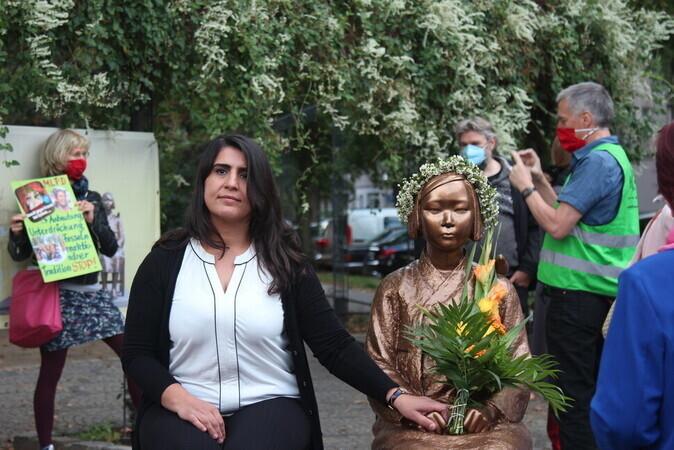hankyoreh
Links to other country sites 다른 나라 사이트 링크
Japanese paper cites German public sympathy for S. Korea in decision to not remove comfort woman statue

One of the reasons behind the decision to leave a Berlin comfort woman statue in place rather than removing it was German public opinion sympathizing with South Korea regarding Japan’s handling of postwar issues in the wake of World War II, the Yomiuri Shimbun newspaper reported on Dec. 10.
Germany is the only country in Europe where statues have been raised to remember victims of wartime sexual slavery by imperial Japan. The newspaper quoted a foreign affairs source as attributing this to the activities of local Korean civic groups and public opinion in Germany that is receptive to South Korea’s arguments. As an example, it mentioned tendencies observed in German press reports. At the time that Seoul and Tokyo were clashing over the Berlin statue’s placement, German news outlets were critical of the Japanese government, with one contending that the “response by Japan’s right wing and conservative government is not helpful toward resolving or preventing wartime sexual violence.”
The newspaper also noted that many German researchers studying Japan have been critical of the way it handled postwar issues. Steffi Richter, a University of Leipzig professor who studies Japan’s New Right and historical revisionism, was quoted as saying that networks associated with these right wing figures were involved in the attempts to have the statue removed.
“Germans tend to hold the belief that they did a good job of handling the situation after the Nazi government, but that Japan’s actions have been inadequate,” a foreign affairs source was quoted as saying.
“In some respects, Korean civic groups have been taking advantage of that sense of pride among Germans,” the source suggested, implying that the decision to keep the statue was influenced by perceptions among Germans who believe that Germany properly resolved the matter of its Nazi administration after WWII, while Japan failed to clear away the vestiges of militarism.
The Yomiuri Shimbun predicted that the issue “will continue into the long term in spite of Japan’s efforts to explain and encourage a proper attitude toward its handling of postwar matters.”
In a hearing on Dec. 1, the council for Berlin’s Mitte borough approved a resolution to the statue’s continued placement. In addition to withdrawing a previous order for the statue’s removal, the resolution also included a six-week extension of the placement’s original end date from Aug. 14 to late September of next year. It also called on the borough and its council to take part in developing plans for the statue to remain in place permanently.
By Kim So-youn, staff reporter
Please direct comments or questions to [english@hani.co.kr]

Editorial・opinion
![[Editorial] Penalties for airing allegations against Korea’s first lady endanger free press [Editorial] Penalties for airing allegations against Korea’s first lady endanger free press](https://flexible.img.hani.co.kr/flexible/normal/500/300/imgdb/original/2024/0502/1817146398095106.jpg) [Editorial] Penalties for airing allegations against Korea’s first lady endanger free press
[Editorial] Penalties for airing allegations against Korea’s first lady endanger free press![[Editorial] Yoon must halt procurement of SM-3 interceptor missiles [Editorial] Yoon must halt procurement of SM-3 interceptor missiles](https://flexible.img.hani.co.kr/flexible/normal/500/300/imgdb/child/2024/0501/17145495551605_1717145495195344.jpg) [Editorial] Yoon must halt procurement of SM-3 interceptor missiles
[Editorial] Yoon must halt procurement of SM-3 interceptor missiles- [Guest essay] Maybe Korea’s rapid population decline is an opportunity, not a crisis
- [Column] Can Yoon steer diplomacy with Russia, China back on track?
- [Column] Season 2 of special prosecutor probe may be coming to Korea soon
- [Column] Park Geun-hye déjà vu in Yoon Suk-yeol
- [Editorial] New weight of N. Korea’s nuclear threats makes dialogue all the more urgent
- [Guest essay] The real reason Korea’s new right wants to dub Rhee a founding father
- [Column] ‘Choson’: Is it time we start referring to N. Korea in its own terms?
- [Editorial] Japan’s rewriting of history with Korea has gone too far
Most viewed articles
- 1[Editorial] Penalties for airing allegations against Korea’s first lady endanger free press
- 2Months and months of overdue wages are pushing migrant workers in Korea into debt
- 3In rejecting statute of limitations defense in massacre case, Korean court faces up to Vietnam War a
- 4Historic court ruling recognizes Korean state culpability for massacre in Vietnam
- 5“Those souls can rest now”: Vietnam massacre survivor reacts to Korean court win
- 6[Editorial] Verdict on Korea’s massacre in Vietnam a first step in atonement
- 7Ruling on Korean atrocity in Vietnam comes 23 years after Hankyoreh 21’s exposé
- 81 in 3 S. Korean security experts support nuclear armament, CSIS finds
- 9[Interview] Continuing the fight for victims of civilian massacres during Vietnam War
- 10Korea’s atrocities in Vietnam, in the words of those who saw and survived them